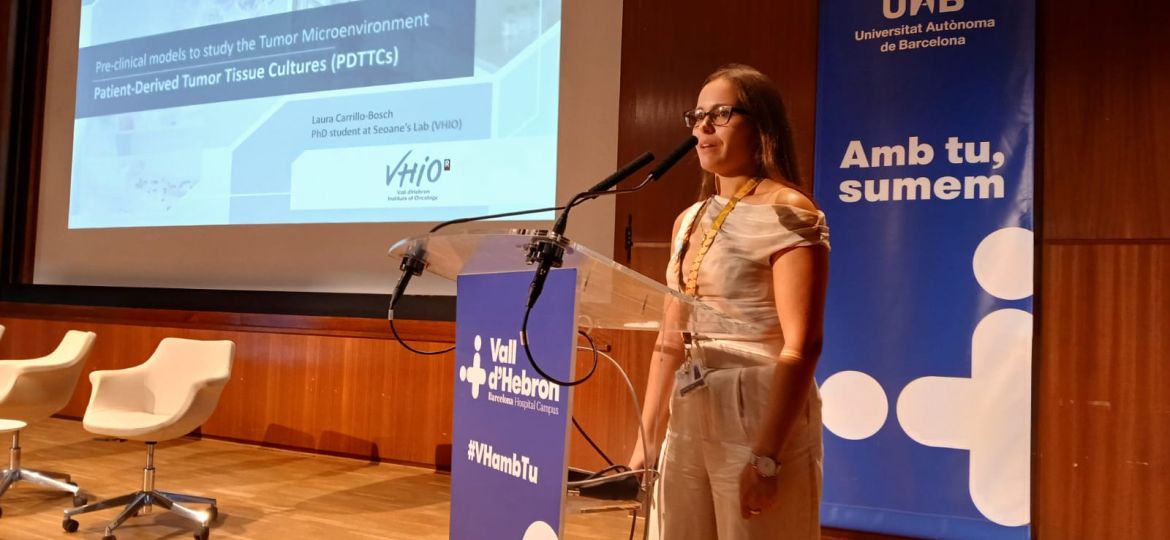
More than 150 participants attended the second edition of the PhD Day at the Vall d’Hebron Campus. A day marked by conferences, presentations, and networking activities, organized by the students and training teams of the Vall d’Hebron Institute of Oncology (VHIO) and the Vall d’Hebron Research Institute (VHIR). Both institutions have once again joined forces in this second edition to offer a day dedicated to promoting and enhancing the doctoral community.
As in the first edition, the day was a success with about 150 participants, most of them predoctoral researchers, but also postdoctoral scientists, principal investigators, research technicians, master’s students, healthcare professionals, and administrative and support staff.
The organization of the day was supported by the VHIO Academy and the VHIR training department.
The inauguration of the day was led by Dr. Albert Salazar, Manager of the Vall d’Hebron University Hospital, Dr. Begoña Benito, Director of the VHIR, and Dr. Josep Tabernero, Director of the VHIO and Head of the Medical Oncology Service at the Vall d’Hebron University Hospital.
Dr. Albert Salazar highlighted the relevance of the campus and its excellence. He also congratulated the students for their effort and encouraged them to maintain this excellence, even though it is a daily challenge. As he himself states, “we need each of the doctoral students to achieve it.” Dr. Benito also took the opportunity to congratulate and thank the doctoral students for organizing this important day and emphasized that it was born from the needs of the students and that they are doing it without limits. For his part, Dr. Tabernero recognizes the importance of this day where students are the protagonists because they are the future of research and the current driving force of research institutions.
One of the objectives of the day was to highlight the different lines of research carried out by the predoctoral community, and for this, eight short talks were given, each by a different doctoral student. The speakers were selected by a committee composed of members of the doctoral community, with the idea of illustrating the great variety and high quality of the research lines currently being studied on campus, with a wide range of topics from genomic platforms for immunotherapy, Alzheimer’s treatment, lysosomal storage disorders, and anaphylaxis biomarkers, to cancer: hereditary cancer diagnosis indexes, innovative gene therapy, and cancer resistance mechanisms.
We also had the presence of Dr. Daniel Truhn, professor at RWTH Aachen University in Germany. We enjoyed his presentation titled “Foundation models – the Beauty and the Beast” where he basically talked about the two sides of artificial intelligence in the field of radiology. As Dr. Truhn explains, “there is usually a multidisciplinary team behind the diagnosis and treatment of diseases. Each of the professionals that are part of this team looks for very specific things, with the risk of not detecting other aspects outside their specialty. And it can take months or even years to reach the right specialist. This is where artificial intelligence comes into play but understood as augmented intelligence, that is, as a tool that supports professionals to make a faster diagnosis and detect what the human eye does not detect.”
In the afternoon, we enjoyed a round table with four professionals who have taken different career paths: Irene Marco Rius, junior principal investigator of the “la Caixa” Foundation – BIST Chemical Biology Programme at IBEC; Evan Floden, CEO of Seqera Labs; Maruxa Martínez, Associate Professor at Pompeu Fabra University and digital and scientific media at PRBB; Malte Beringer, grant consultant, scientific editor, and trainer.
As a novelty compared to the first edition, a thesis competition was held in which eight students presented their research project in just 3 minutes each. There have been two awards: David Ramirez Gomez, with the thesis “Alzheimer’s retreat: in multifactorial treatment to remember”, was the winner of the jury prize; and Anna Behr, with the thesis “Every Life Matters: Innovative Therapy against Rare Rebel Gene” has won the audience award.
The day concluded with more informal activities, where only doctoral students could participate, as their main objective was to foster networking among them.
The event was sponsored by Sarsted, Thermo Fisher, Vector Builder, Astrazeneca, and Bestours corporate, and with the collaboration of Microbacterium, Centre Cívic Casa Groga, Science Museum, CosmoCaixa, La Campana Penguin, Random House, Simon Coll Xocolaters, and Bomboneria Pons











